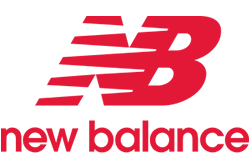
Self-Sufficient Access and Analysis of Key Metrics Across a Global Organization
Quick facts
Organization: New Balance Athletic Shoe, Inc.
Industry: Footwear and Apparel
Revenue: >$2B
Employees: 4,000+
Company Description: New Balance markets width-sized footwear and apparel for men, women, and children.
Headquarters: Boston, MA
Website: https://www.newbalance.com
Solution: Diver Platform

New Balance Athletic Shoe, Inc. was faced with the cumbersome problem of printing reports from an ERP system that lacked ad hoc capabilities. IS was confronted with an ongoing backlog of requests to produce reports in useful formats. What started out as a fix for an inefficient reporting system quickly evolved into an enterprise-wide BI solution.
“People were always needing reports for specific accounts, products, divisions, sales reps, etc. sorted in various ways and then they would have to compare it with other information to figure out what happened,” explains Elaine Ritchie, Director of IS. A report request could take months to complete and the information required often changed by the time a person received it. Today, managers in every department throughout Massachusetts, Maine, and Canada use Dimensional Insight’s flagship product, Diver Platform™ (Diver), to navigate through data Models to answer their own questions and analyze particular areas of interest. With the self-sufficient data access and flexibility of Diver, New Balance eliminated one quarter of their printed reports, all special one-time reports, and the entire backlog of new report requests.
“Implementation went very fast,” recalls Ritchie. New Balance built their first two data Models in one night – one included all open orders and the other included shipments that had occurred. A pilot team of department managers were given access to the Models, and “for the first time, they had visibility into the data and could do any analysis needed, make any report they wanted, on their own,” says Ritchie. They could click through the shipment Model and focus on specific styles or specific product categories that Foot Locker, for example, ordered last year — information that was very cumbersome to obtain in the past. When the pilot team of managers became familiar with Diver, Ritchie went to other managers to learn more about their information needs and New Balance’s solution for distributing the right information to the right people quickly began to take shape.
Sheela Shanbag, a member of the IS group, designed forty Diver Models that are tailored for, and distributed to, offices and factories throughout the enterprise. To build the Models, she extracted tab-delimited files from several databases. To maintain the Models, she created batch files for each to be updated daily, weekly, or monthly. “Diver is an exceptionally easy-to-use tool and a great product for the end user.”
The CEO, CFO, Sales Managers, all executives, and all Sales Reps now use Diver to self-sufficiently access and analyze key metrics across the global organization. “People are learning a lot about all of the information contained within the company. And Diver empowers all to be much more productive, making business decisions quicker and more effectively,” says Ritchie. The company uses Diver to monitor and manage performance in retail stores and the emerging e-commerce business by analyzing and comparing key metrics, sales goals and budgets, year-over-year growth, top 10 product sales, store traffic, and e-commerce sales.
All systems roll up into Diver:
- ERP systems
- product lifecycle systems
- warehouse management systems and
- retail systems
With well over 1,200 users across New Balance’s worldwide organization, Diver is the most used, single application in the company.
“Implementation went very fast … for the first time we had visibility into the data, and could do any analysis needed …”
Customer service
The customer service department uses Diver to make sure orders will ship on time. By “diving” into Models, the Customer Service department is able to track orders that are approaching cancel dates, check on discounts, and analyze shipments over time in order to plan shipments for the future.
Sales
The sales department typically uses Diver to look at sales figures and year-to-date sales compared to the same time last year.
Models for the sales department include:
- Open Orders
- Net Sales Year to Date
- Open Orders Plus Sales this Year
- Sales and Returns This Year
- Sales and Returns Last Year
- Sales and Returns This Year versus Last Year, and Order Activity for One Month. Users answer any question they have by cross-referencing “Dimensions” in the Models.
Typical Dimensions for a sales Model include:
- Customer Number, Division (domestic, international, and Canada)
- Accounting Period (by month and week)
- Product Category (running or walking)
- Sub-category (men, women, and children)
- Type of Account (department stores vs. specialty stores)
- Territory
- Sales Rep
- State
- Style
“It’s important for us to be able to look at all sales by style, and by width, and to be able to analyze that on an account basis,” explains Holly Irvine, Sales Systems Administrator. For example, if a customer places an order for everything in a D width, but their history shows that they’ve been successful with a variety of widths, Irvine will challenge the customer on their order for two reasons:
- She knows that they will eventually come back and need the other widths, and
- New Balance has built their inventory to supply their customers based on their previous year’s demand for sizes and widths. They use Diver to analyze previous styles, and predict what customers will need in normal, wide, and narrow widths for the new, updated styles. The sales department also uses Diver to focus on channels of distribution, which enforces selling the breadth of the line into the majority of the accounts, rather than selling a hot style.
Marketing
Steve Ettridge, Director of Marketing, uses Diver for sales forecasts and planning, and to initiate new styles. “We look at an 18 to 44 month calendar by style forecast, and get a picture of a style’s business by looking at shipments that have already occurred, affirmed open orders, and key account contract orders. We speculate the demand and put an order into the system and it’s required that the sales department put in an affirmed order to go against the contract order. Because the contract window may only be six months into the future, we also include a forecast,” says Ettridge.
He speculates the demand for a new style by analyzing open orders/contracts as well as benchmarking a new style against its predecessor.
“Diver is an exceptionally easy-to-use tool and a great product for the end user.”
Challenge
- Detailed reports required for analysis of a complex, dynamic business
- Information requirements are constantly changing
- Printed reports from limited ERP system did not provide enough information
- Severe IS backup in report requests
Solution
- The CEO, CFO, Sales Managers, all executives, and all Sales Reps self-sufficiently access and analyze key metrics across the global organization
- BI solution to deliver the right information to the right people
- All systems roll up into Diver
Results
- Decrease reporting costs and eliminate request backlog
- Improve effectiveness and speed of decision-making
- Improve visibility of detail data
“I am able to look at the different types of discounts, standard costs, and regular list prices, so I have a better understanding of discounts and profitability by customer and product.”
Ettridge will start initiating a new style twelve months before the style is due to ship. “If I’m initiating the ‘609’ shoe, which is an updated version of the ‘608’ shoe, I’ll dive into the 608 to get a better sense of what accounts were significant to that style, even though the 608 is still in the open order and forecast stage. I look at two things for the 608: key account contribution to the style, and the breakdown of sizes and widths.” Key account contribution determines the focus for the new shoe (based on the success of the 608) and key accounts to target for the 609 (accounts that would have been successful had they purchased the 608). The breakdown of sizes and widths allows Ettridge to increase his turnover by reducing or eliminating widths for sizes that did not perform well. The Marketing department also analyzes open orders and shipments for the calendar year to find deficits. “I’ll look at Foot Locker’s open orders for the 608 running shoe, broken down by month for the present year, and compare it with last year’s style, the 607 running shoe, also broken down by month for last year. If Foot Locker purchased a hundred thousand pairs of the 607 and they’ve only purchased sixty thousand of the 608 so far, I know that, given our seasonality, we should be eighty percent booked on that style. I’ll streamline it from there and say I have a deficit and go figure out why,” explains Ettridge.
Finance
The Finance department forecasts by month, so they look at open orders by month. Shanbhag has tailored the finance Models to go down to the invoice and transaction levels for the current and previous month. “We have a bottoms-up independent assessment of the integrity of what the sales group comes up with,” says John Withee, Vice President and Corporate Controller. Withee uses Diver to analyze discounts, predict sales for the next few months, and track the integrity of open orders. “I’m able to look at the different types of discounts, standard costs, and regular list prices, so I have a better understanding of discounts and profitability by customer and product.” Withee’s reports include sales dollars and units with different levels of discounts for New Balance’s 40,000 items and 5,000 customers. He explains that orders are constantly being shipped, returned, canceled, and revised, which is why it is important to analyze dollars and units separately.
He is able to see credits that were given to customers and why credits were given (i.e., a defective product). Withee also explains that Diver reduces the need to directly access the ERP system. If there is an incorrect price on the ERP system, Withee is able to find the mistake using Diver. He uses Diver to get down to the transactional level and, more often, identifies discount problems before they are shipped. He obtains a list of the incorrectly priced items and their order numbers which makes it easy to follow up and remedy the problem within the ERP system. When asked about a return on investment, Withee replied, “We have not specifically quantified to date, but it is clearly there. Some of the return can be measured by recovering incorrect billings promptly, while others are a result of holding down expenses. These expenses include the software costs of seats on the ERP system as well as people in Finance and within Operations.”
During a time of growth, the Finance department is able to go a lot further without adding resources. Diver permeates all aspects of financial operations including:
- Inventory Analysis
- Profit and Loss Forecasts
- Business Segmentation and Analysis
- Accounts Receivable Exposure
- Purchase Price Analysis and Control, etc
Much further returns are expected throughout the organization as business re-engineering efforts expand.
Download Case Study